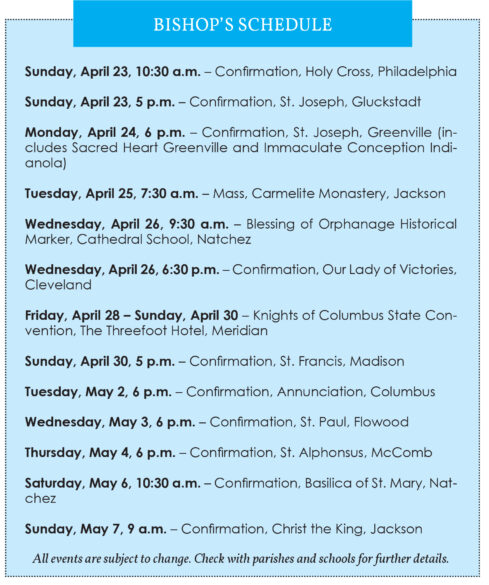By Bishop Joseph R. Kopacz, D.D.
The final day of the Easter Octave is Divine Mercy Sunday. This year we celebrated the day of the resurrection of the merciful Lord from the dead for the 24th time since the Jubilee Year of 2000 with the canonization of St. Faustina when St. John Paul II called the universal church to a feast of divine mercy on the second Sunday of Easter.
Divine Mercy Sunday focuses on the compassionate love of God given through Christ’s death, burial and resurrection. As Pope John Paul II stated, “Divine Mercy reaches human beings through the heart of the Christ crucified.”
The iconic symbol of divine mercy is marked by the two rays of light, red and blue, shining from the heart of the risen Lord who revealed to Sister Faustina that they represent blood and water illuminating the world.

We immediately think of the testimony given by the Evangelist John, who, when a soldier on Calvary pierced Christ’s side with his spear, sees blood and water flowing from it. (John 19:34) Moreover, if the blood recalls the sacrifice of the Cross and the gift of the Eucharist, the water, in Johannine symbolism, represents both Baptism and also the gift of the Holy Spirit. (John 3:5; 4:14; 7:37-39)
The Lord Jesus in the miracle of the resurrection transformed death into life, despair into hope, and fear and shame into peace and promise. Each of the four Gospels testify to the power of the resurrection and on Divine Mercy Sunday the Gospel of John takes center stage with his Pentecost moment.
The apostles were huddled together in fear after the crucifixion with their world shattered like broken glass. Traumatized and deeply wounded by the crucifixion the risen Lord came into their midst and bathed the 11 with God’s mercy, peace and the gift of the Holy Spirit. He showed them his hands and his side, even inviting Thomas to touch the wounds inflicted by the crucifixion. His wounds healed their shattered spirit. His cleansing gift of peace with the outpouring of the Holy Spirit empowered them to live in a way they had never known.
Before breathing the gift of the Holy Spirit into his born-again friends the crucified and risen One gave them their mission. “As the Father has sent me, so I send you,” and in these words and in this action, we see the plan of God’s salvation let loose in the world.
The church’s mandate is the same yesterday, today, and until the Lord comes again, i.e. to announce the Good News of Jesus Christ and to make disciples of all the nations. In the light of Divine Mercy, St. Paul provides some wonderful imagery regarding the vision for our mission. All of us are called to be servants of Jesus Christ and stewards of God’s mysteries, ambassadors of Jesus Christ and ministers of reconciliation.

The gift of divine mercy we have received; we ought to give as a gift. During the synod process in our diocese those who participated voiced a strong concern for a greater unity that addresses the wounds and polarization in our church and in society. Divine mercy is that leaven in the bread that can transform this brokenness.
For example, within the body of the church the victims of sexual abuse must be provided every opportunity for healing, peace and new life. The perpetrators and those who failed to protect need the mercy and forgiveness of God in large doses. Wherever the wounds exist in his Body, the church, the Lord stands ready to heal. In Christ we want to be new creations. As we look inward to restore the life in abundance that Jesus promised, we also live and move, and have our being in the world to announce the Gospel bringing this Good News of the Kingdom of God to our world.
In the spirit of Divine Mercy, the prayer attributed to St. Francis of Assisi comes to mind as a beacon for the work entrusted to us.
“Lord, make me an instrument of your peace. Where there is hatred, let me sow love. Where there is injury, pardon. Where there is doubt, faith. Where there is despair, hope. Where there is darkness, light. And where there is sadness, joy. O divine master, grant that I may not so much seek to be consoled as to console, to be understood as to understand, to be loved as to love. For it is in giving that we receive; it is in pardoning that we are pardoned. And it is in dying that we are born to eternal life. Amen.”
